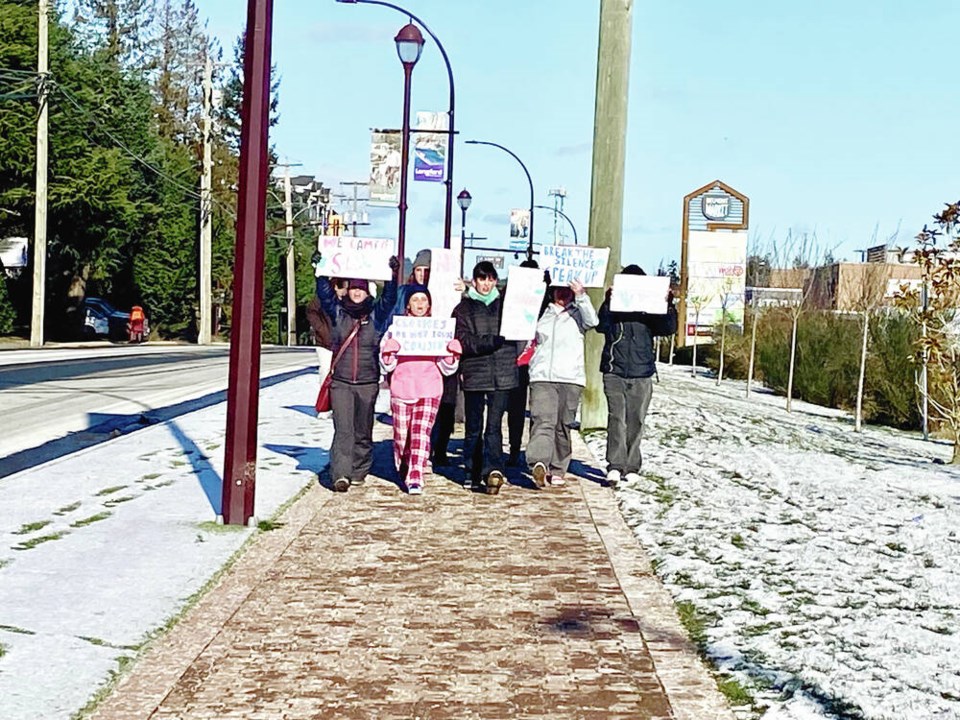As some students prepare to walk out of classes in Sooke School District to protest lack of consequences for sexual harassment and assaults, a sexual-violence expert is warning that perpetrators who aren’t dealt with at the K-12 level could go on to repeat their behaviour in college and university.
Michelle Novakowski said schools need to take immediate punitive steps to stop sexual harassment and assaults as soon as they happen.
“If these young men who are perpetrating these acts, if they’re not stopped and don’t get consequences and maybe some therapy, a core group will go on to be repeat offenders in college and university,” said Novakowski, who has delivered victim-services core training through the Justice Institute of B.C. and sexual-assault related training for the Ending Violence Association of B.C.
Parent Stacy Lewis said students, including some from Belmont Secondary School, Royal Bay Secondary, Journey, Dunsmuir and Centre Mountain Lellum middle schools, and Westshore Learning Centre, have committed to join the walkout at 1:15 p.m. today. They have a private Facebook page called “sd62 walkout against sexual violence.”
They are unhappy with what some view as a lack of clear policy and consequence for the perpetrators of sexual harassment and assaults. Parents, grandparents, community members have been invited to join the event.
The walk-out is in part a reaction to a story in the Times Colonist in December in which a 12-year-old West Shore student described how she was sexually assaulted by five boys on a school field during school hours.
The boys involved were never disciplined
The district has said that it made changes last year in the wake of complaints, including training for principals. The students, however, want to see a more tangible change in policy and procedures on sexual harassment and violence.
“In assemblies, they are told about no vaping or smoking or smoking drugs on school property,” said Lewis, adding there should be similar warnings about sexual comments, harassment and assault.
School lessons on consent, sexual health and respect are important but don’t deliver the message that there will be consequences for sexual offences, said Lewis. “For some reason they don’t talk about the dirty little stuff, the comments, the stuff that happens in the hallways.”
Novakowski said demonstrations against sexual violence anywhere at any time are helpful. “I think that is just key to getting their voices heard,” she said.
Novakowski said research suggests that many youth in middle school and high school who make sexual remarks or engage in inappropriate sexual behaviour often think better of it and say later, when confidentially surveyed, that they would “never do it again.”
However, a handful who don’t face consequences will escalate their behaviour and will go on to reoffend in universities, colleges and trade schools, she said.
By the time it gets to sexual assault, “these guys are generally bullies and they’ve been bullying and getting their way with other things,” said Novakowski. “The bully needs to have consequences quick and early.”
Sexual violence often begins with sexual comments in classrooms, school hallways and playgrounds, then escalates to grooming, then touching and sometimes sexual assault, she said.
Yet those early comments and inappropriate behaviour often go unpunished.
“Unfortunately, the old “boys will be boys” mentality still exists,” she said.
Novakowski said parents of a perpetrator — most often male — often contribute to the problem when they defend their child without question.
She conceded, however, that when there is no confession or witnesses in a juvenile case, it’s almost impossible to get Crown-approved charges and convictions. Even when there is physical evidence, it can become a he-said-she-said situation.
If the allegations can’t be substantiated, it’s typically the female victim who is moved to a different class or school — protected from her alleged abuser but alienated from her friends, Novakowski said.
Also, “for the girls that come forward, if they’re not given some compassion and some trauma-informed treatment, all the other girls that come behind are not going to talk.”
Novakowski has worked in the anti-violence field for over three decades, starting in 1997 in Nanaimo as the co-ordinator for Haven Society’s community-based victim service program.
She went to become the executive director for Elizabeth Fry Society in Kelowna, which helps vulnerable women and girls in the criminal justice system, and established a team of administrative and mental-health leaders from School District No. 23 in the central Okanagan to develop a sexual-assault protocol for the school district.
She said she hopes male students will join Wednesday’s walkout because “peer pressure is in this case powerful.”
>>> To comment on this article, write a letter to the editor: [email protected]




